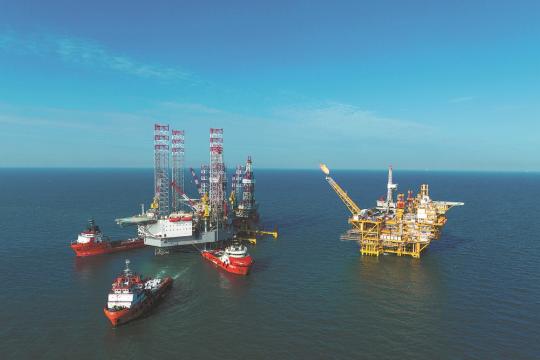Marine economy lifting energy reserves, trade
China's marine economy has emerged as a key driver in boosting energy reserves, renewable energy, and global trade, according to the Ministry of Natural Resources.
Over 60 percent of China's new crude oil output came from offshore production last year, reinforcing the ocean's role as the backbone of the country's energy expansion. Offshore wind power also reached new milestones, with cumulative installed capacity accounting for more than 50 percent of the global total, latest data released by the ministry showed.
The ocean's contribution extends beyond energy. Desalinated seawater production is expected to exceed 400 million metric tons in 2024, while industrial cooling seawater usage surpassing 180 billion tons. The marine fisheries sector continued its upward trend, securing its position as the world's largest producer for the 35th consecutive year, it said.
"The marine economy has been progressing steadily throughout last year, with marine resources managed effectively and technological innovation achieving notable results," said Feng Lei, deputy director of the marine strategic planning and economy department at the Ministry of Natural Resources.
CNOOC Energy Economics Institute, a think tank that is part of China National Offshore Oil Corp, also believes that offshore oil and gas remain key global investment hot spots in 2024.
China's offshore oil and gas output is set to reach a new high. Offshore crude oil production is forecast at 65.5 million tons in 2024, with new output of 3.3 million tons accounting for over 60 percent of the country's total new crude oil production, said the think tank.
Offshore natural gas output is expected to grow by more than 2 billion cubic meters year-on-year to 26.2 billion cubic meters, it said in the China Marine Energy Development Report 2024 released in December.
Offshore natural gas discovery remains an area of significant untapped potential, said Wang Zhen, head of the CNOOC Energy Economics Institute.
"As global offshore crude oil contributes over 70 percent of new discoveries, China's offshore resources are set to play an increasingly vital role in energy security," he said.
As global offshore oil and gas technologies are advancing toward higher efficiency and lower carbon emissions, China has achieved system-level breakthroughs in deepwater oil and gas technologies and equipment, with intelligent offshore oilfield operations improving significantly, he added.
China's offshore oil discovery rate has reached 30 percent, exceeding the global average of 24 percent.
CNOOC has been reporting record growth in both crude oil and natural gas output, supported by advanced engineering technologies.
Analysts view China's burgeoning marine economy as a cornerstone of the nation's economic resilience, resource security, and technological leadership, with significant implications for global markets and sustainability.
China's ongoing investment and focus on upstream production will be crucial for ensuring its energy security, said Li Ziyue, an analyst with BloombergNEF.
Lin Boqiang, head of the China Institute for Studies in Energy Policy at Xiamen University, said the fact that over 60 percent of China's new crude oil output in 2024 came from offshore production underscores the strategic importance of marine resources in diversifying energy supplies and bolstering energy security.
Additionally, the scale of offshore wind power, which accounts for over half of global installed capacity, demonstrates China's growing leadership in renewable energy technologies and its ability to scale these projects globally, he said.
According to the ministry, China has also maintained its dominance in marine equipment and shipping. The country holds over 50 percent of the global market share in shipbuilding and offshore engineering equipment. It accounts for more than one-third of global maritime trade volume and container throughput, underscoring its pivotal role in driving global economic growth, said the ministry.

